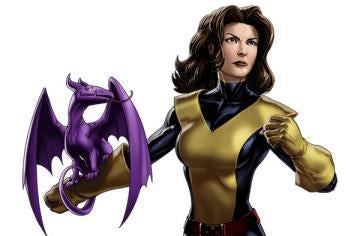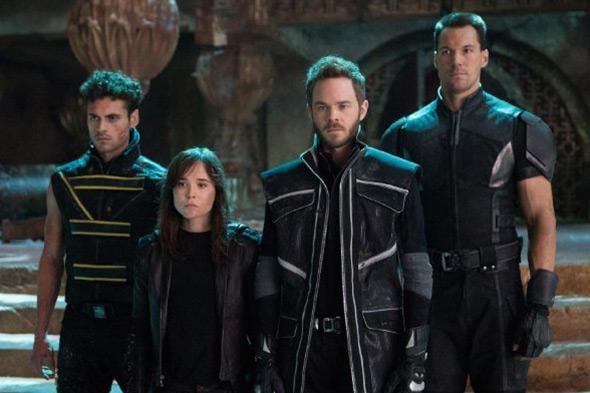Dear Bryan Singer, Simon Kinberg, and all the other people who made decisions about X-Men: Days of Future Past:
First, I want to thank you for keeping my friends on the big screen. These are important times not only for mutants, but for the people whom mutant stories represent: stigmatized populations, visible minorities, people with special abilities and disabilities. I want to thank you, too, for the preview screenings that you guys arrange each time an X-Men film opens here in Salem Center (thanks to your interdimensional portal); there aren’t many other theaters, on your Earth or ours, that admit my pet dragon, Lockheed. All the X-Men films have been fun to watch—I’ve met so many alternate versions of us already, on various Earths, that I try to see yours as just one more. But I have mixed feelings about this new one, and I’d like to tell you why. If I were writing to anyone else I’d say “spoiler alert!”—but you know what happens; you wrote it.
As you probably also know, this particular story, or rather the story “Days of Future Past” in the comics about us, was a big deal for me—it’s the first adventure that gave me a starring role. At the time I was new to the X-Men, not quite 14, still learning how to use my powers (phasing through solid objects, disrupting electronics, being really good at physics and math). I was so new that I was vulnerable to telepathic takeovers: Professor Xavier had taught my teammates how to shield their psyches, but I was, literally, more open-minded.

That’s why the X-Men from a dystopian future, one where giant, mutant-hunting robots called Sentinels had taken over North America, chose me for their attempt to change history. The surviving mutants of that bad future (set in 2013, in a comic published in 1981) sent my older self’s mind back in time, into the body of my younger self, so that I could convince the X-Men to take action; by preventing an evil mutant from assassinating a senator, they could avert the anti-mutant panic that led to the Sentinels’ creation. (Comics fans love that story, still.)
That’s sort of what happens in the movie, too, except that I barely get to do any of it. I loved the beginning, though! There’s a cool fight scene involving me—that is, dystopian-future me, Ellen-Page-as-me—right at the start, and I get the first line of dialogue—“Too late, assholes!”—as we escape marauding robots. Page-as-me gets to work with some newer X-Men, like Blink, and with the love of my life, Colossus, whose transformation into organic steel looks kind of awesome. Also I get to use at least a bit of the martial arts stuff I learned in Japan.
After that scene, though, future-me spends almost the whole movie silently poised at Wolverine’s temples, using my powers to send him back into the body of his younger self, into 1973, when he gets to talk Charles Xavier and a couple other mutants into preventing an assassination. Phooey.
They have to send Wolvie, we’re told (Kinberg, you say so in interviews too), because his mutant healing powers mean he doesn’t age, so that the stress of time travel won’t kill him, and so that the same actor can portray him in the future and in 1973. Also most of my other teammates in 2013 weren’t born in 1973. But if they wanted a film starring Ellen Page, who plays me, they could have set most of the film in the present day, and hired an older actor for future me. Don’t think I didn’t notice when you almost—almost!—apologized: Charles tells Wolverine, “I’m sorry, but they sent back the wrong man.” Wolverine responds, “It was supposed to be you.” No! It was supposed to be me.
Now the movie did got some parts of the X-Men just right. For example, Professor Xavier is a jerk! When we meet him the young Xavier (James McAvoy) is not a teacher but a decadent, drug-dependent, failed rock star dude, after the end of his first team (from X-Men: First Class) and before he assembled his second (the one I came in with). He’s addicted to an injectable drug that lets him walk, but inhibits his telepathy: He can live as an ordinary human being, or he can use the powers that set him apart, but he can’t do both. That’s a very X-Men idea, and Xavier’s self-important anguish over it—later to be transformed into teacherly lecturing about mutant responsibility—is right on. Also right on is Hugh Jackman as Wolverine: His gruff sarcasm aces the Logan I know, and it’s not his fault that you guys gave him my job. Your Quicksilver isn’t the superfast mutant I’ve met, but he’s maybe actually better: He’s the kind of who-cares stoner teen who used to get on my nerves in middle school—I don’t think he’s done a page of homework in his life—and it’s amazing that Logan can work with him at all.

© 2013 - Marvel/Twentieth Century Fox Film Corp.
Trouble is, the prison break with Wolverine and Quicksilver was pretty much the last part of the movie that felt very much, to me, like the X-Men I know. As I walked out through the theater wall after the credits (I was not showing off; I was letting the others leave faster!) I kept trying to figure out why all those scenes of the 1973 X-Men felt so wrong (besides, of course, that Wolvie was doing what I had done). Part of the problem was that the X-Men of 1973—the ones in the film—aren’t representative: not in who they are (just Xavier, Beast and Wolverine for most of it), and not in what they do.
The stories about us written by Chris Claremont in the late 1970s and early 1980s were some of the first mainstream comics that had more than one female character at a time, with lines and powers and motives and everything. The movie, on the other hand, doesn’t even try to pass the Bechdel test. Its 1973 plot has one woman, Mystique, the third in a classic bromantic triangle with Xavier and Magneto. The 1973 plot—that’s most of the movie—also has one non-white speaking role, a Vietnamese officer whom Mystique kills and impersonates. The future looks terrible (and grey and cloudy—why do all dystopias look grey and cloudy?) but at least it’s diverse: Storm and Bishop, Blink and Warpath, tear up the screen.
But my problem with Days is not just that its historical past (like the real past) is mostly run by white guys. (OK, Beast is sometimes a blue guy, but you get my point.) Nor is my problem that Ellen Page gets so little to say. It’s that the X-Men should be a team. We quarrel but we learn to work together, and we learn to fight together, even when we hate each other’s guts. All our cool moves, when we battle the bad guys, are team moves, as the X-Men X-perts Rachel Edidin and Miles Stokes have explained (check out their podcast). The X-Men believe in cooperation, among individuals, among social groups (we even work with supervillains), and across species. (Lockheed feels the same way.)
And cooperation—teamwork—isn’t enough in evidence in 1973, where most of the movie takes place. When future-me and Storm and Colossus and Bishop and Blink fight the good fight in the bleak future, we work together; our best moves are team moves. But for most of the rest of the film, there’s not enough teamwork on display. Our heroes take on bad guys one by one, or one on one, shot by shot, even when they’re fighting in the same place. And most of the talk isolates the characters too: Logan persuades Charles, and then Charles must persuade Mystique, to do the right thing. I know that Mystique has a big decision to make—in a way, the 1973 story is about her, but it’s also about how two powerful guys won’t stop telling her what to do. I guess that’s part of being an X-Man too. It’s not like Professor X never gave us instructions. But it’s not exactly my favorite part.
I’m a teacher—at the moment, in the comics, I’m running a school—so maybe I’m just too alert to classroom dynamics. But it seems to me that if you can get students to work together, you should; if you can represent the X-Men as a team— and not just as a few fierce white guys, squaring off one at a time, one on one—you probably should. That’s what the Xavier of Days is still learning; I hope the next screenwriters who tell our stories learn it too.
For the non-mutant’s take on X-Men: Days of Future Past, read Dana Stevens’ review.